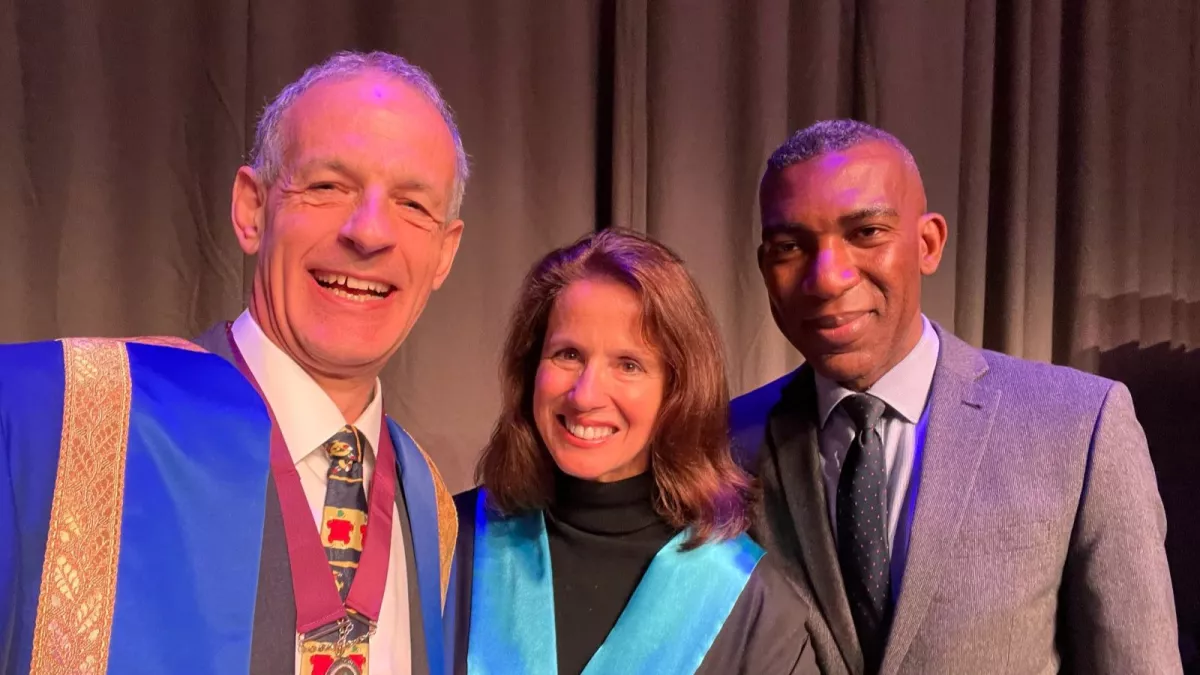
In this update, Steve shares key College news: the launch of our 'Your paediatrics, your future' campaign, new national safeguarding and IHA standards, refreshed flu resources, major policy developments and highlights from our global child health work.
We had a glorious membership ceremony in Edinburgh last Wednesday. There were over two hundred members there celebrating their achievement in becoming a Member or Fellow. All gowned up, they came onto stage to receive a certificate from Jan Dudley, our Registrar, and to have a photo with me. The room was filled with proud parents, partners, friends, and lots of young children who were determined to join in the fun, despite not fully understanding the achievements being celebrated.
The day was bittersweet as it was our Chief Executive Officer, Rob Okunnu’s, last membership ceremony.
Rob has decided it is the right time to move on from the College, after being with us since 2019. Our College has become ever stronger whilst he has been working with us; our membership has risen by 32% during this time. I will miss his company, wise counsel and dry wit, and wish him the very best for his next role.
While the ceremony made for a fantastic day, we recognise that every day can’t be as memorable. What makes a great day for you? Please have a think about it. Are there any common factors to your great days? Your paediatrics, your future is a College campaign, launching today ahead of our 30th anniversary, to allow you to reflect on and share a great day you have had. Members might be able to use other’s experiences to their own benefit in future.
We want to share these, hoping that a colleague or fellow member can apply your experience to their working life, giving them a great day in future. After all, the better we feel, and the stronger we become as a community, the more we support our workforce and can shape the future of child health. Stories will be published throughout 2026, and you can have yours published anonymously if you wish. You’re also welcome to submit more than one.
Please think about something you’ve done to improve your wellness and create more great days at work. You can submit your story here.
#WDYCD4U – New RCPCH standards for Initial Health Assessments
For the first time, national standards have been introduced for Initial Health Assessments (IHAs) for children and young people entering care across the UK. These standards, developed by our RCPCH Child Protection Standing Committee, aim to address longstanding inconsistencies in care delivery and improve health outcomes for some of the most vulnerable children in our society.
The standards provide a clear, evidence-based framework for clinicians and commissioners, ensuring timely, holistic assessments that consider physical, mental, and emotional wellbeing. They also embed the voices of children and young people, making their experiences central to service design.
Flu factsheet and respiratory guidance
This winter, we’re seeing a significantly early rise in paediatric flu cases across emergency departments and general practice. The clinical burden is substantial, with many children presenting, and many requiring hospital admission. It’s important for us to reinforce the message that flu is not a benign illness in children. Even those without underlying health conditions can become seriously unwell, and complications such as pneumonia, febrile seizures, and exacerbations of asthma are not uncommon.
As paediatricians, we witness the impact on patient and staff of flu first-hand. That's why we’re encouraging colleagues to continue advocating for flu vaccination among eligible children and young people. Vaccines remain the strongest frontline defence for children and are key in reducing hospital admissions this winter.
To support your conversations with families, the College has developed a flu vaccine factsheet – designed to address common concerns and provide clear, evidence-based information. Additionally, to support you in treating children who do sadly end up in hospital, the College has also refreshed our national guidance to support hospitals in safely managing children with viral respiratory infections. It outlines best practices for infection prevention and emphasises the importance of protecting vulnerable children. The guidance also encourages collaboration between hospital and community care to reduce admissions and ensure children receive timely, safe treatment during periods of high viral circulation. Many thanks to the team for providing these resources for members and our patients.
Child health services policy in England
It has been a busy couple of weeks in the child health services policy world. On 6 November, the Independent ADHD Taskforce published their final report, making a series of recommendations to the health system. Themes include improving early identification, integrated care, and equitable access to services. The College welcomes the report’s recognition of the need for sustainable investment to meet current and future demand and underlines that sufficient resource is essential to the success of any system change. You can view our response here.
This was swiftly followed by publication of the Kingdon review of children’s hearing services in England. You will all know Camilla as my predecessor. Earlier this year she was commissioned by the Secretary of State for Health and Social Care to review the response of NHS England to service failures in children's hearing services and to make recommendations for improvement. The review has revealed systemic failures across the NHS and Department of Health that left hundreds of babies and children with undiagnosed hearing problems and does not make for easy reading. At its heart are the babies, children and families who have been let down by a system that should have protected them. My thoughts are with those affected by these serious failures. Read our full response here.
Enhancing early childhood development in Nigeria: a collaboration project
Early childhood is the foundation for lifelong health and wellbeing, yet millions of children worldwide face barriers to reaching their full potential. In Nigeria alone, there are almost 32 million children under the age of 5, and over 50% of them are considered at risk of poor development, with many missing vital early interventions due to limited resources, stigma, and systemic challenges.
To tackle this, we partnered with Obafemi Awolowo University Teaching Hospitals Complex (OAUTHC) in Ife, Nigeria through the Global Health Partnership UK’s Global Health Workforce Programme. Together, we worked to strengthen systems, build local capacity, and empower caregivers to better support children’s development.
This collaboration:
- Equipped health professionals with the latest early childhood development (ECD) knowledge and skills
- Refurbished and equipped a dedicated Child Development Centre
- Led policy advocacy which culminated in the launch of Osun State’s first Early Childhood Development Strategy
And much more! You can read about our work in Nigeria and across the world.
Safeguarding children and young people and children and young people in care: competencies for health care staff
We are delighted to announce the launch of the new safeguarding competencies microsite - The Intercollegiate document (2025) - Safeguarding Children and Young People & Children and Young People in Care: Competencies for Health Care Staff. This new microsite is hosted by RCPCH, and has been co-produced by the following steering group members:
- College of Sexual and Reproductive Healthcare [previously Faculty of Sexual and Reproductive Health]
- Public Health Wales – National Safeguarding Service
- Royal College of Anaesthetists
- Royal College of Nursing
- Royal College of Paediatrics and Child Health
- Royal College of Physicians and Surgeons of Glasgow
- Royal College of Psychiatrists
- Scottish Government
The development and launch of the new microsite have been a collaborative partnership, and stakeholders have been widely consulted across professional partner organisations and UK nations.
Safeguarding children and young people and supporting children in care remain key priorities for all health services/systems and the responsibility of all health care professionals. Royal Colleges and health professional bodies have a vital role embedding competencies, delivering training and visible leadership
In case you missed it...
The College has responded to the 10 Year Workforce Plan call for evidence by publishing a hard-hitting report outlining the significant gaps in the child health workforce. It warns that without adequate focus on paediatrics and the child health workforce in the DHSC plan, which is due to be published next spring, the UK Government will struggle to realise its three shifts to digital, prevention and community. Read RCPCH’s evidence and recommendations for the paediatric and child health workforce in full.
Best wishes all round,
Steve
This message was emailed to all RCPCH members who are opted in to receive College updates / professional updates. You can update your contact preferences at any time - log in to your RCPCH online account, go to My account | Your contact preferences, then make sure you've ticked College updates / professional updates.








